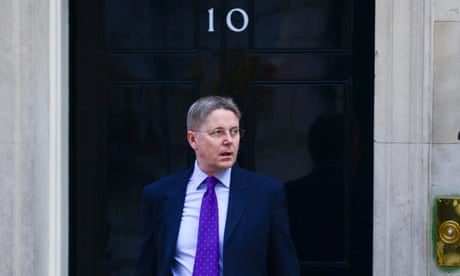Cabinet Office says UK would spend years renegotiating trade and other agreements with EU and non-EU countries
European Union flags in Brussels. Photograph: Olivier Hoslet/EPA
Car manufacturing, farming, financial services and the lives of millions of Britons living in Europe will all be affected as the UK takes 10 years to extricate itself from the EU, an official report says.
The government’s first official analysis into how Brexit would unfold in practice says a decade of uncertainty would hit “financial markets, investment and the value of the pound”. It also warns that the rights of 2 million British expats to work and access pensions and healthcare in EU countries may no longer be guaranteed.
Written by civil servants in the Cabinet Office, and seen first by the Guardian, the document says that it would not be feasible to leave the EU within the two-year time frame stipulated by existing treaties. “A vote to leave the EU would be the start, not the end, of a process. It could lead to up to a decade or more of uncertainty,” they concluded.
The 10 years cited in the report includes the time it would take for Britain to exit the EU, to set up a new trade and related agreements as well as negotiate fresh trade deals with the US and other countries elsewhere. The document says they would only be completed at the end of a three-stage process that will be triggered in June if Britain votes to leave the EU.
Out campaigners have accused the government of launching “Project Fear” and claim the riskier scenario for Britain is staying inside the EU. They compare extreme warnings, like the ones being delivered today, to those made when Britain was considering joining the euro.
Analysis If Britain voted to leave the EU, what would happen next?
Brexiters play down the difficulties of renegotiating trade and other deals, but the process of withdrawal could take years
Read more
Iain Duncan Smith, the work and pensions secretary, said the European migration crisis posed a larger threat to the UK than Brexit. “Why would we have such a low opinion of the British people that we go out and talk about ‘leaping into the dark’, we talk about ‘profound shocks’?” he asked on the BBC’s Andrew Marr Show.
He added: “The in campaign’s whole strategy seems to be about basically saying we’re too small, we’re too little … This country is the greatest on earth.”
Monday’s report claims that the process by which Britain would leave the EU would be “complex” and grinding, with other European countries trying to extract as much as possible.
It says the only legal way to withdraw from the EU is through article 50 of the Treaty of the European Union. But it argues that there is no precedent for this and that Britain would be unlikely to achieve a successful negotiation in the two-year time period it sets out.
Extending the process would require the unanimous agreement of all 27 other EU countries – and could result in states pushing for concessions, it says. Meanwhile, a new agreement on trade and wider co-operation might require ratification in some national parliaments.
“The UK’s withdrawal from the EU would mean unravelling all the rights and obligations – from access to the single market, to structural funds for poorer regions, to joint action on sanctions – that the UK has acquired both during our accession to the EU and over our 40-year membership. As well as negotiating its withdrawal, the UK would also want to negotiate its post-exit arrangements with the EU,” the officials claim.

Senior civil servants are being told to bypass pro-Brexit ministers
Read more
The report details a number of issues that would have to be resolved in any Brexit negotiations, including access for UK citizens to the European health insurance card, cross-border security arrangements, the rights of UK fishermen to fish in non-UK waters, including in the North Sea, and access to the agency that monitors the safety of medicines.
The government argues that British trade would also be plunged into uncertainty as it would become necessary to renegotiate individual deals with more than 50 countries that have an arrangement with the EU.
The report says the UK will be “constrained” in its ability to secure those agreements until the first round of Brexit negotiations are complete. It suggests that the United States might not even enter talks with the UK before concluding its own agreements with the remaining EU countries.
Matt Hancock, Cabinet Office minister, said: “This government analysis shows that leaving the EU would lead to a decade of damaging uncertainty. The risks to our economy are clear and would leave the jobs and prosperity of the British people dangerously exposed.”
The report does not give a timescale for when article 50 would be triggered butDavid Cameron has suggested it would be straightaway. It also does not mention a second referendum, which sources say is not on the table.
Voting Brexit to punish the PM would be self-defeating
Matthew d'Ancona

The report could fuel anger in the Conservative party about the way in which the referendum is being fought. Conservative out campaigners are already unhappy that Sir Jeremy Heywood, the cabinet secretary, has told Whitehall officials not to show papers relating to the EU to ministers campaigning to leave.
There have also been reports that Tory ministers and backbenches have warned David Cameron that he could face a leadership challenge whatever the outcome of the vote on 23 June if he does not tone down attacks on Boris Johnson and other Eurosceptics.
Conservatives are able to campaign on both sides, but many are concerned about the scale of “blue-on-blue” attacks.
Advertisement
It comes as John Howard, the former Australian prime minister, said he thought there was a strong case for Brexit – telling the Australian media that the EU was a “fundamentally flawed concept” that threatened the sovereignty of its members.
The Britain Stronger In Europe campaign was also in action, mocking the leave campaigns for failing to say what economic model the UK would follow in the case of Brexit. They say countries outside the EU, which “include Vanuatu, Nicaragua, Peru and Macedonia” are among those that Britain might emulate if it were to leave.
Matthew Elliott, chief executive of Vote Leave, said: “People will not be impressed with David Cameron’s relentless campaign of fear. We are optimistic about Britain’s future but the government seems intent on doing Britain down. The UK will thrive outside the EU – just like every other country in the world.”





No comments:
Post a Comment